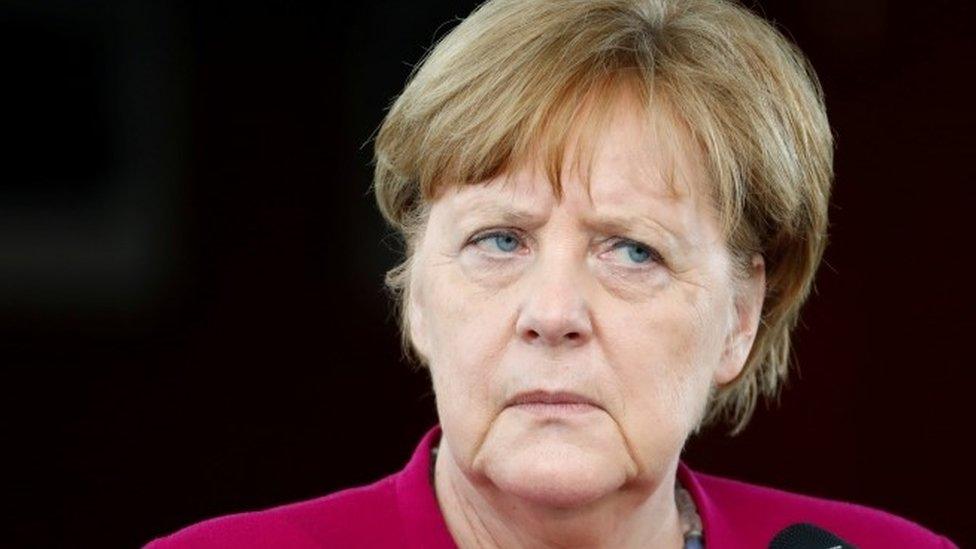Annegret Kramp-Karrenbauer: Who is the new leader of Germany's CDU?
- Published
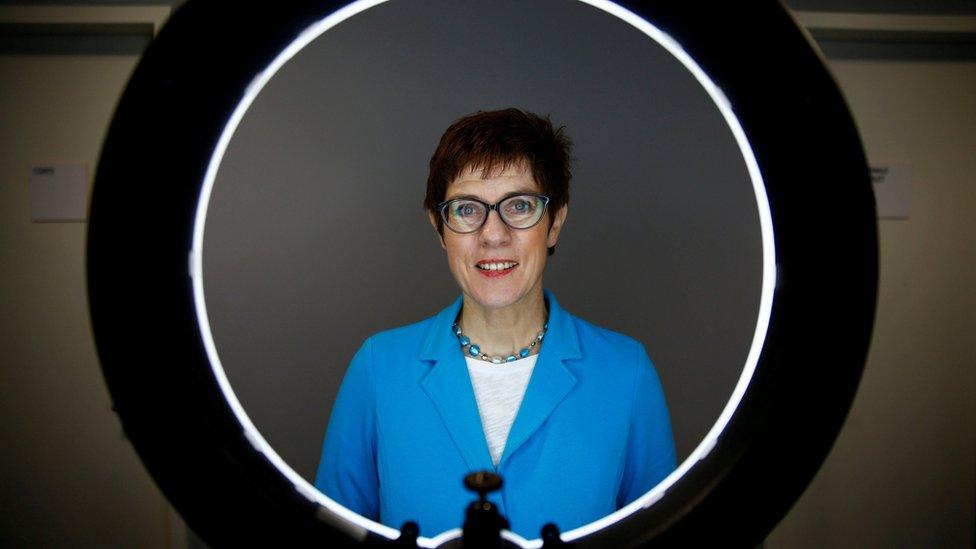
AKK, as she is known, is from Germany's smallest state Saarland
Annegret Kramp-Karrenbauer has been elected leader of Germany's ruling Christian Democrat Union (CDU) party, bringing Angela Merkel's 18 years at the helm to an end.
As the party's general secretary, Ms Kramp-Karrenbauer was favourite to take over when Mrs Merkel announced her retirement in October.
But she clinched only a narrow victory over Friedrich Merz, a long-time Merkel rival, in a run-off vote in Hamburg, with 51.8% of the vote.
Now the head of Germany's largest party, Annegret Kramp-Karrenbauer, 56, could become the next German chancellor.
Who is she?
AKK - as she is widely known - grew up in a Catholic family in Saarland in south-western Germany, the country's smallest state (apart from the city-states: Berlin, Hamburg and Bremen).
She joined the CDU in 1981 as a 19-year-old student and, after completing a masters in political science, worked her way up in state-level politics.
Ms Kramp-Karrenbauer became the first woman to serve as a state minister for internal affairs in 2000 and the first woman to serve as prime minister of Saarland, a position she held from 2011 to 2018.
After being nominated by Chancellor Merkel, AKK was elected as CDU general secretary with a record 98.9% of the vote.
In her farewell speech as party leader, Mrs Merkel praised AKK's 2017 electoral success in Saarland, in a clear hint of the chancellor's personal preference in the leadership race.
She lives in her hometown of Püttlingen with her husband of 34 years, Helmut Karrenbauer, who quit his job as a mining engineer to take care of their three sons while she pursued her political career.
What does she stand for?
Ms Kramp-Karrenbauer was seen as Ms Merkel's anointed heir and a moderate choice for CDU's leadership.
She is seen as a pragmatic, level-headed politician, with an unpretentious style and a reputation for calm analysis as well as political acumen.
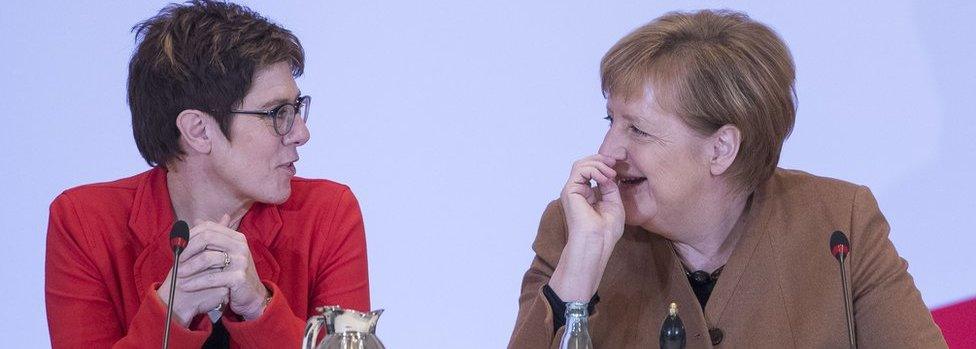
AKK was seen as Ms Merkel's heir apparent and protégé
While she supported Ms Merkel's refugee policy and has a liberal position on women's rights and a minimum wage, she has also expressed more conservative views.
As a practising Catholic, she has a traditional view on marriage equality and has expressed concerns about giving same-sex couples full adoption rights.
She is also in favour of reinstating year-long military or social service and has questioned the right of ethnic Turks to hold dual German and Turkish citizenship. Turks are Germany's largest immigrant community.
What has she said?
Since announcing her candidacy, Ms Kramp-Karrenbauer has addressed a range of domestic and international issues.
"You always stand on the shoulders of your predecessor," AKK told German TV last month. "One inherits the entire package, the positive as well as the negative."
Ms Kramp-Karrenbauer has said she wants to improve on Ms Merkel's legacy and has suggested she would encourage debate within her party on issues such as immigration to encourage new proposals that could become government policy.
"This is democratic order, which reflects a self-confident party," she said. "That's what we want."
Is she Merkel 2.0?
Critics have dismissed her as a mini-Merkel or Merkel 2.0 but observers say there are clear differences between the two women.
Even AKK herself said there was nothing mini about her as a 56-year-old woman with grown-up children and an entire political career of her own.
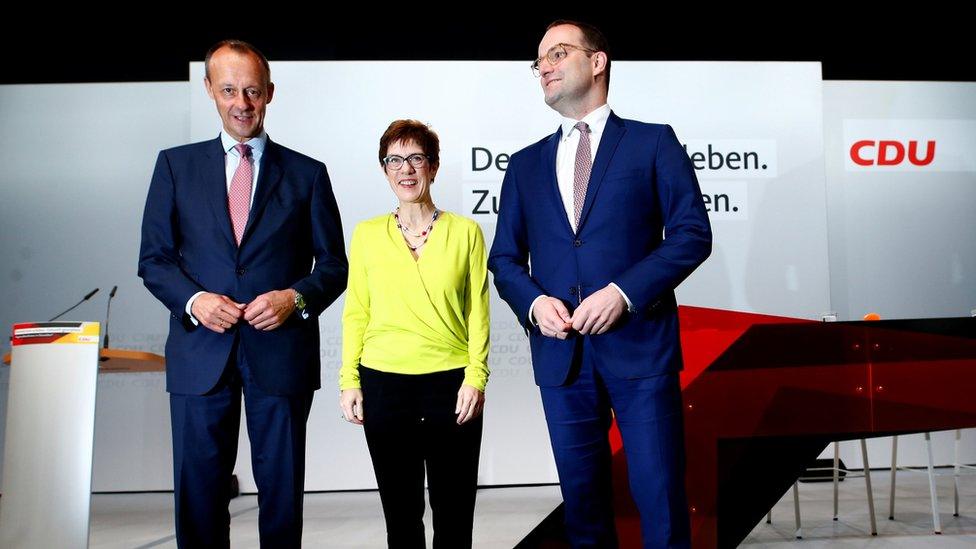
CDU leadership candidates for the party chair Friedrich Merz (L), Annegret Kramp-Karrenbauer and Jens Spahn
Ahead of her election as party leader, Ms Kramp-Karrenbauer went on a "listening tour" to find out what her party's grassroots wanted.
She reported members were full of "pride, frustration, concern and uncertainty".
"Fundamental questions must be asked in the party," she told German tabloid Bild. "Being a people's party cannot mean being a kind of all-purpose political shop that offers something for everyone."
She went on to say: "We need to discuss and decide what conservative, Christian-social and liberal look like today and we need to have a clearer profile."
- Published29 October 2018
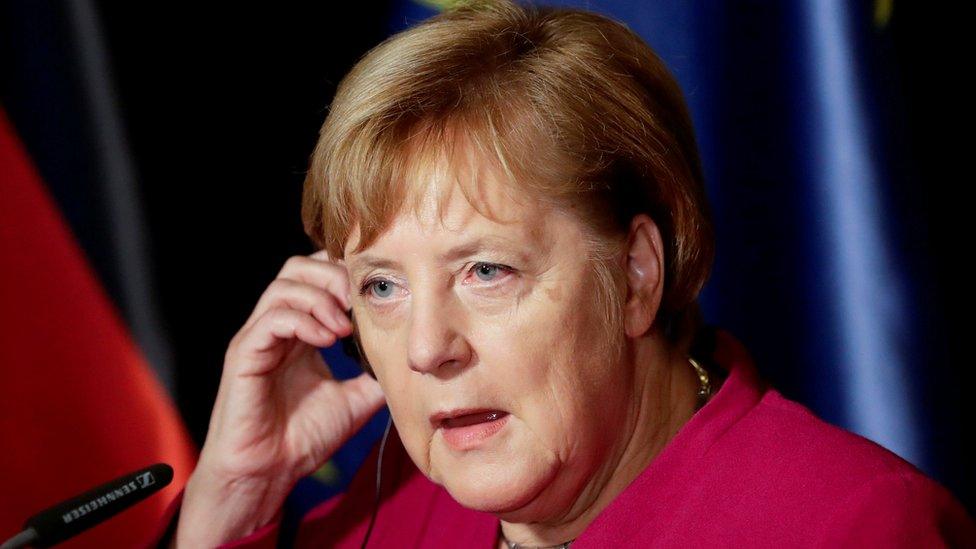
- Published18 June 2018
